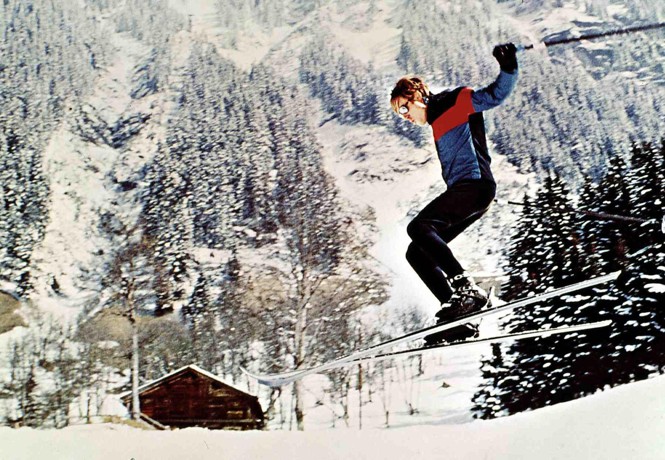Robert Redford ruled the golden-boy category, whether he was twirling a Colt revolver or directing a camera’s glance. He sure looked like one of life’s winners. As others have pointed out in their remembrances of the actor and director, he was a “quintessential leading man” who possessed “near-iconographic physical beauty.” But the sheen was slippery, as he was well aware. His decades of work contain a theme so pronounced that once you notice it, you see it everywhere in his films: the hollowness of an easy victory.
In so many of his roles, Redford played an athlete or an outdoorsman. Start counting with The Natural and the list expands to include his collegiate romancer in The Way We Were, the opening credits of which include him credibly hurling a javelin, rowing crew, and breaking the tape in a sprint. Even his lethally still, laconic gunfighter in Butch Cassidy and the Sundance Kid has all the jaunty arrogance of a great athlete, once he takes his thumbs out of his slouch-hipped belt. “Nice-looking piece,” the reedy-voiced Strother Martin says, and asks dismissively, “Can you hit anything?”
“Sometimes,” the Kid answers.
Told to skip fancy gunplay and just shoot at a target, he misses by a foot. Martin spits contemptuously and starts to walk away. Without a twitch of his handlebar ’stache, Kid says:
“Can I move?”
“Move? What the hell you mean, move?”
With a drop to one knee and a rapid blam–blam, he dances the target across the dirt, and then rises and delivers that immortal reply:
“I’m better when I move.”
In Little Fauss and Big Halsy, he’s a pro dirt biker. In The Great Waldo Pepper, a stunt flyer. In The Electric Horseman, a commercially soured rodeo cowboy. A backpacker in A Walk in the Woods, a solo sailor in All Is Lost, in which he carries an entire film with hardly a word. A mountain man in Jeremiah Johnson, a safari hunter in Out of Africa, a trainer in The Horse Whisperer, and of course, a lefty ballplayer in The Natural. In all of them, Redford does much of his own riding, wing walking, throwing, catching, and hitting. More important, in most of them the character eclipses the actor. Hubbell Gardiner lives.
His con man / card shark / grifter Johnny Hooker in The Sting makes simply eating with a fork in a diner look deft, idiosyncratically so. But—and this is significant in naming Redford’s staying power, in why he’ll have such an intelligent and meaningful legacy—all of these characters are a little too deft for their own good, and didn’t Redford know it, and play it. “If you’re in a position of being viewed iconically, you’d better have a mechanism to take yourself down to keep the balance,” he once wrote in Time magazine.
For me, Redford’s masterpiece is 1969’s Downhill Racer, his first foray into independent filmmaking. Though it was directed by Michael Ritchie, the project was driven by Redford, who was its central character and governing sensibility. He was determined that it be an authentic rendering of the perils of unbraked competition. It’s a film about, as so very many of his works would turn out to be, “Pyrrhic victory,” as he said years later.
Downhill Racing remains, for my money, the most truthful sports film ever made. (Confession: I may be partial to it because of a personal connection. Redford researched his role by following the 1968 U.S. Olympic ski team across the most harrowing slopes of Europe, partly in the company of a writer from Sports Illustrated named Dan Jenkins, my father.) Redford’s portrayal of David Chappellet is as revealing as an X-ray: He captures the great athlete’s boredom with mundanity, the self-centeredness of his pursuit, the bravado required by the terrifying exposure of an unarmored body speeding down the steeps, skis clattering over ice—and the sudden silence when a man goes airborne, off balance.

Redford’s insight into elite sport, as he remarked during a promotional tour in 1970, was that “frequently it fits you only for the wrong things, even breaks you utterly.” Winning, and its attendant praise, in Downhill Racer’s telling, lasts about a minute. Then it begins to corrupt, a truth rendered in the final scene, when Chappellet briefly catches the eye of the young Austrian racer who was beating him until the Austrian crashed. Chappellet’s jolt of self-awareness, that he just as easily could have lost if the Austrian hadn’t caught an edge, is immediately overwhelmed by a congratulating crowd. At the final frame, you can already feel the inevitable toll coming, the day when he will be defeated, just another limping veteran.
Redford tells this story time and time again in his films, even the most unsporting. The Candidate? It’s about a race—and the final three minutes are among Redford’s finest, as he plays the newly elected Senator Bill McKay’s aghast awakening from mindless competitiveness: “What do we do now?” Ordinary People, which he directed, is an excruciating essay about a sporty boating-and-golfing couple who imagine themselves securely among life’s winners but prove incapable of dealing with real crisis. A River Runs Through It—a film I’ve seen possibly 10 times, and never without being wholly absorbed by the loveliness of its frames and of Redford’s poetic narration—focuses on a handsome athlete-fisherman, played by Brad Pitt, whose ease duels with recklessness. Quiz Show is about nothing if not how the hagiography that attaches to a “winner” can twist the most benign-seeming men. “What was I supposed to do at that point, disillusion the whole goddamn country?” Charles Van Doren asks in an effort to excuse his cheating.
Redford’s distrust of winners came from firsthand experience as an athlete, and stardom only deepened it. He was apparently something of a phenom growing up on the poor side of Van Nuys, a multisporter who said he played American Legion baseball, and a strong enough junior-tennis player to warm up the great Pancho Gonzales at the Los Angeles Tennis Club. But he became so disenchanted by the striving that he got kicked out of school and went off to Europe to paint, and then to New York to act.
He told a 2014 forum at the John F. Kennedy Presidential Library and Museum, “One of the themes that I’ve tried to work in films is the subject of winning, that this is a country that’s all about winning.” He continued, “I was told a slogan as a kid when I was playing baseball: Listen, it doesn’t matter whether you win or lose, it’s how you play the game. That’s what’s important, and that was drummed into my head and drummed into my head. Yet, what I experienced was just the opposite. What I experienced was winning was everything. So, I think that sunk so deep into my psyche that when I became able, years later, to be an artist or to make film, I wanted to tell the truth about my country that wasn’t being told.”
Redford’s lifelong theme was perhaps best distilled in a line from the 2000 golf fable The Legend of Bagger Vance, which he directed: “What I’m talkin’ about is a game, a game that can’t be won, only played.”
Art is a game that cannot be won, only played. “I try to convey to the artists that success has to be handled gingerly,” Redford once said. “You want to shadowbox with it; you don’t want to really engage with success until you find a way to engineer it so that you don’t wind up being its slave.”
To Redford, winning was a dangerous deception, as perilous to the heart as equating gorgeousness with character. “All good things—trout as well as eternal salvation—came by grace; and grace comes by art; and art does not come easy,” Norman Maclean wrote in A River Runs Through It, a book Redford clearly revered. Redford’s work includes real triumph, but it’s the triumph of an artist whose substance was slow-won, stroke by stroke, block by block, until he turned himself into a truly beautiful man.
The post What Robert Redford Knew About Winning appeared first on The Atlantic.




